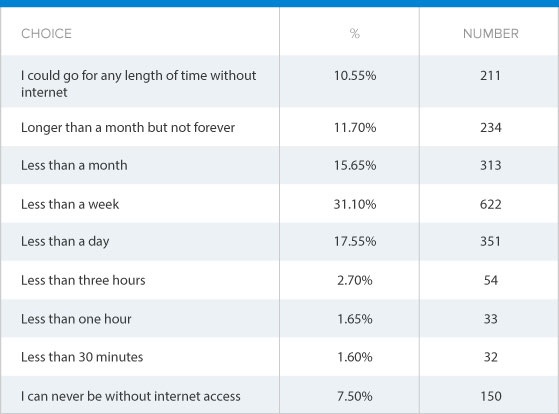Only one in ten UK broadband users say they could live without access to the internet, according to 2,000 respondents surveyed by broadband, TV and mobile comparison site Cable.co.uk.
Key findings:
• Just 10% of UK broadband users say they could live without broadband
• One in five (20%) said they would last less than a day without it
• One in twenty say they wouldn’t last more than half an hour

Just 10% of respondents said they could live without broadband indefinitely, as opposed to 21% who said they could last a day or less without access. One in 20 said they could only last 30 minutes.
Broadband expert and Cable.co.uk editor-in-chief Dan Howdle said of the results:”Broadband is more than just a technology now. It’s the medium by which we run our informational, financial, and social lives. Even those who dismissed broadband as inessential a decade ago now are now researching holidays, shopping, maintaining personal relationships and more online.
“Compare broadband with the birth and evolution of the telephone. Like the telephone, broadband is no longer some nascent fad, but something so deeply entwined with our personal and interpersonal lives that we can no longer distinguish the technology itself from the emotional content of our online social interactions.
“Which is why most of us substitute the notion of living without broadband for the notion of living without our friends, brothers, sisters, sons, daughters and parents.
“And that’s why it’s all but unthinkable.”
Chartered psychologist Alan Redman previously told Cable.co.uk why rising numbers of ‘internet addiction’ stories are hitting the headlines:
“Personally I think it’s possible to get addicted to the internet in the same way it’s possible to get addicted to anything.
“It’s all related to the pleasure centres of our brain – something you find rewarding releases a Dopamine hit and we get pleasure.
“The internet is rewarding. Social media especially centres on these little hits.
“I guess the difference, or maybe something that is unique about the internet, is the frequency of the hits. They are small but frequent, maybe that’s a bit different from gambling or smoking.”
The government aims to bring superfast broadband (24Mbps and above) to 95% of the UK by the end of 2017.

